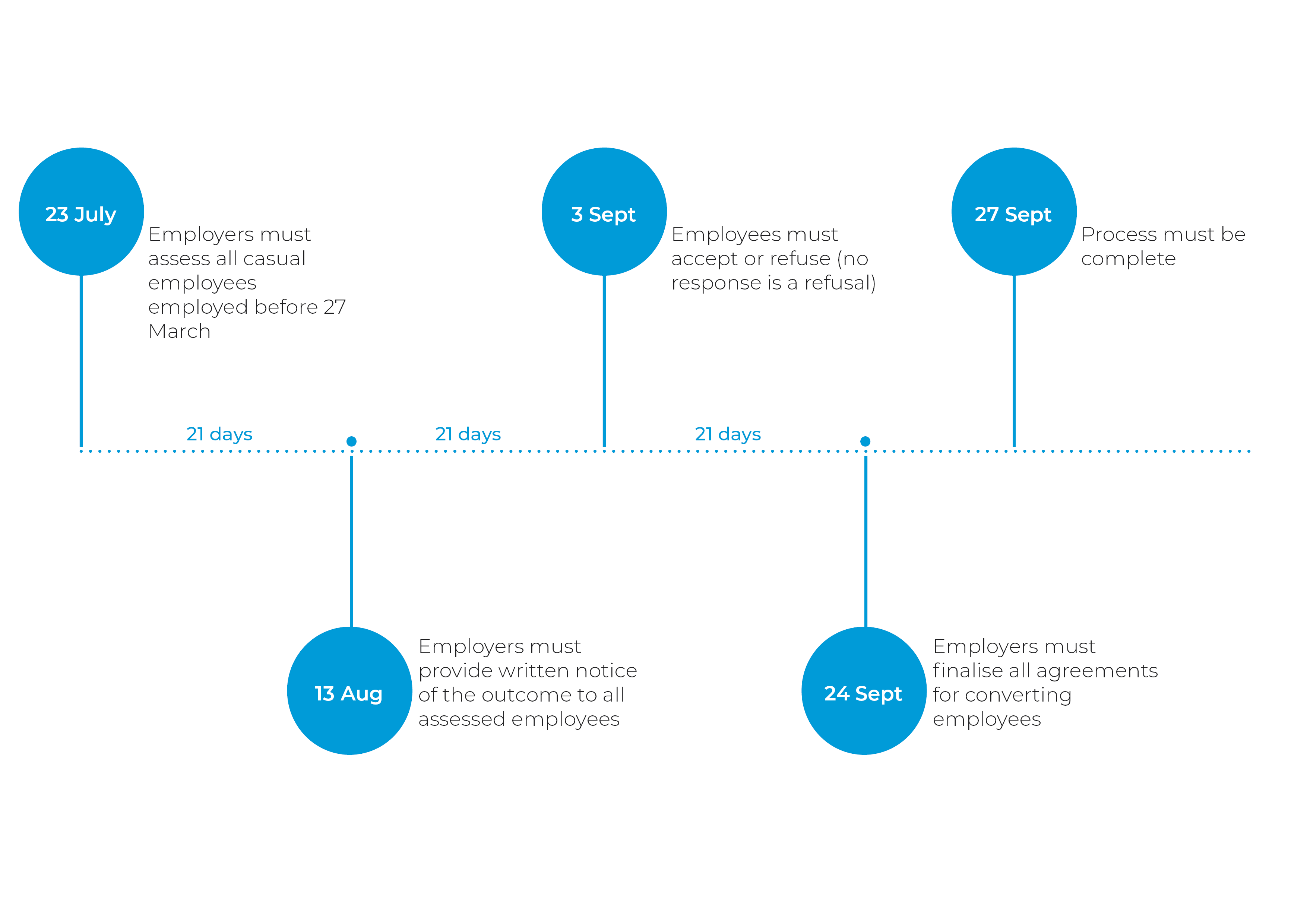
The countdown is on for employers to achieve compliance with the new casual conversion provisions under the Fair Work Act 2009 (Cth) (FW Act) within the legislative timeframe.
As discussed in our previous article, considerable legislative changes to casual employment took effect earlier in the year.
Critically, if you employ casual employees and are not a small business, you must take action soon to comply with the new provisions. A transitional period is currently in operation, requiring employers to assess all casual employees for conversion by 27 September 2021. However, this does not include casual employees employed after 27 March 2021.
After the transition period ends on 27 September 2021, employers are required to assess casual employees for conversion within 21 days of their 12-month service date. This means employers now have an ongoing, positive obligation to assess casual employees for conversion to permanent employment.
In this article, we outline the new casual conversion requirements, key timeframes and summarise the essential steps and processes employers must take before 27 September 2021.
During the transition period, employers must:
Once complete, employers must issue the Casual Employment Information Statement (CEI Statement) to all remaining casual employees. The CEI Statement is available from the Fair Work Ombudsman website.
Employers have until 27 September 2021 to assess all existing employees (excluding those employed after 27 March 2021) for casual conversion. They must offer conversion to permanent employment if the employee meets the eligibility requirements and there are no reasonable grounds not to do so.
The practical effect of the transition period is that when the full conversion provisions take effect on 28 September 2021, the employer should have already reviewed all existing casual employees. This will ensure no casual employee misses an opportunity to convert.
As the conversion requirements have timeframes, there are steps employers must take before 27 September to achieve compliance. Based on the legislative timeframes, here is a recommended timeline of key dates for employers to ensure they are compliant by the deadline:

These dates are not legislated dates. Rather, they are an estimate using the statutory deadline of 27 September 2021 and the indicative timeframes of 21 days between each step in the assessment process. Employers may commence this process earlier or later than these dates outlined above. We recommend employers mark 23 July 2021 as the date to commence the assessment process. If employers commence the process at a later date, this will not allow for the full extent of time between each step in the process. A process which commences at a later date will likely result in a rushed assessment process.
Employers may recognise the efficiencies of issuing group notices after assessing multiple employees for casual conversion. For example, it may be open to employers to issue a global notice to all casual employees who have not been employed for 12 months (and are therefore illegible for conversion). The legislation is silent on this point. However, in our view, it is somewhat implicit in the FW Act that the assessment process should be conducted on a case-by-case basis. Employers should carefully consider the risks and benefits of this approach if adopted.
The Fair Work Commission (Commission) is currently reviewing all casual employment provisions in modern awards to ensure alignment with the FW Act. Recently, the Commission released their provisional views on whether award conversion clauses need to be amended.
The Commission has issued a provisional view that casual conversion clauses in some awards in key industries, such as retail, should be replaced with a reference to the new FW Act casual conversion provisions. This is to ensure that the awards are consistent and operate effectively with the FW Act.
The full review of all the awards is not due to be finalised until 27 September 2021. Employers should be mindful of any changes to modern awards moving forward.
After the transition period ends on 27 September 2021, the ongoing obligation for employers to offer casual conversion for eligible employees is enlivened. Employers must assess all casual employees who are approaching 12 months of employment and provide them with written notice detailing the outcome of their assessment.
As we have outlined, there are a number of important steps employers must take before the transition period ends on 27 September 2021. Based on the legislative timeframes, employers should ideally begin their casual conversion assessment process before 23 July 2021. An employer who commences this process at a later date risks non-compliance by the 27 September 2021 deadline.
A key aspect of the process is assessing whether employees are eligible for conversion and determining whether to offer permanent employment. Employers should give themselves an appropriate opportunity to conduct this assessment. The decision to ‘offer’ or ‘not offer’ conversion requires careful consideration based on a number of criteria.
Holding Redlich can assist in providing advice on the casual conversion requirements, including drafting employee communications to impacted employees. If you have any questions or need assistance, please contact us.
Authors: Charles Power, Jennifer van Bronswijk & Julia Wyatt
Disclaimer
The information in this publication is of a general nature and is not intended to address the circumstances of any particular individual or entity. Although we endeavour to provide accurate and timely information, we do not guarantee that the information in this article is accurate at the date it is received or that it will continue to be accurate in the future.
Published by: